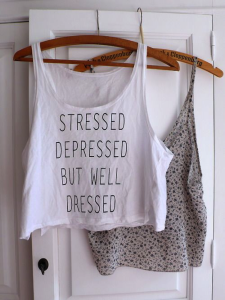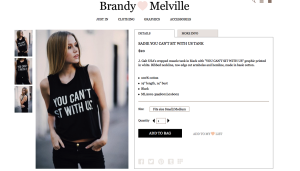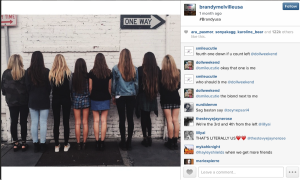
By Caryn Rubanovich, Intern 2015
Dear Brandy Melville,
I’ve been thinking about you and your stores quite a bit recently. Frankly, I’m confused and frustrated by the mixed messages you’re sending. It’s only fair for us to talk this out.
I didn’t know you existed until relatively recently. But it seems that if you ask any teen active on social media sites like Instagram, Twitter, and Facebook, chances are they’re well aware of your brand of clothing, or it’s at least on their radar. I know that the business world has heralded you, Brandy Melville, for setting trends and for capturing the attention of young consumers.
You are notorious for your “one size fits most” model. To be honest, when I first heard about this, I thought, “Oh, that sounds nice. Away with those doggone labels and sizes! Crush size discrimination once and for all.” But after my mini “boo-yah!” moment, I realized that just about all of the clothing items have a “one size” or “small” label, and jeans are for 25-inch waists (approximately a U.S. size 0 or 2).
What?
First things first, Brandy Melville: Your “one size” does not fit “most” no matter how you spin it. On average my fellow American sisters wear a size 14. And actually, more of us wear a size 16 dress than those of us who wear sizes 0 and 2 combined. That’s just fact.
According to a 2012 report from the Center for Disease Control and Prevention, the average 16-year-old girl is around 5 feet 3 inches tall, with a weight of 138 pounds and a 31-inch waist. So who is this “most” you speak of?
I question how inclusive you actually are. I’m not the only one puzzled, either. In a recent article on Businessweek.com, Doug Stephens, a retail consultant, says that your brand “has cultivated an aura of exclusivity, in part because of the limited sizing. Teens who are into the brand like the idea that the clothing isn’t for everyone. One size doesn’t fit most.”
I bring up these points not to thin-shame. But I am frustrated by your “one size fits most” claim.
There are many contradictions with your policy — the way your clothes in stores are labeled “one size” and your online size is “fits size small” or “fits size small / medium.” Also the fact that online there is only one model wearing your clothes, who is 5’7″ with a 25-inch waist. If you really wanted to reflect your “one size fits most” policy, wouldn’t you have a variety of models with different body sizes and shapes in your clothes? Wouldn’t you celebrate body diversity on your Instagram posts? You would … if that was actually something that mattered to you.
But you don’t do any of those things. What I hear you saying is that size “small” is the “one size” — the only size — in your eyes.
Still don’t see the issue? Let me break it down another way.
This whole “one size fits all” business reminds me of the way history is too often taught recognizing only a single narrative, which subsequently becomes the “right” narrative. Note: It may have been the one you were tested on in elementary school, like the “great” guy Christopher Columbus who stumbled upon the Americas.
These narratives glorify one particular group or experience and recognize “one story” in the name of fitting “most.” In fact it only describes one experience and completely ignores other realities and perspectives. By failing to recognize others’ experiences equally, we silence and shame others, implicitly telling their stories aren’t “right” or worthy of attention (cue Chimamanda Ngozi Adichie’s “The Danger of a Single Story”). This is what you’re doing when you equate “small” with “one size” as the “right size.” “Small” is not universal.
I know it can be difficult for those who are petite, thin, or small to find clothing that fits properly. And I don’t doubt that for some customers you, Brandy Melville, have filled that void with clothes that fit their frames. Those are some of the victories we should all celebrate, because everybody deserves to find clothing that makes them feel comfortable / fabulous / cute / fierce. We all want to be able to purchase clothing that fits us in all the right ways, that makes us love our bodies even more.
But the “one size fits most” philosophy perpetuates the deeply engrained, oppressive belief that “small” is the only size worthy of being recognized and valued. This leaves too many other body sizes and shapes out of the picture.
Small sizes have historically had a great deal of privilege. Our society has glorified small sizes, often refusing to cater to others. Most clothing companies happily design for small frames, while plus sizes are an afterthought. Some companies even discriminate against people with certain body types who they don’t want to fit in their clothes (cough cough LuluLemon). As Refinery 29’s Stephanie Sporn points out, “There’s no legal obligation for a retailer to assume an inclusive approach in its marketing, but we’d argue that there might be an ethical responsibility to.” Realizing this, companies like Aerie have taken proactive steps to listen to their customers’ concerns and act accordingly. Take note.
Did you see that recent BuzzFeed article you were featured in? I wasn’t surprised to read about the experience of five BuzzFeed employees of varying body size and shape, who had the following reactions after trying on your clothing, Brandy Melville:
“‘One size fits all’ sends a message that if you don’t fit into the clothing, whether it’s too big or too small, you’re not ‘normal,’ and leads to all sorts of body dissatisfaction.”
“It made me sad to realize that I felt better about myself when I actually could fit into these clothes. That’s not how I should feel about clothing.”
“Trying on some of these clothes unexpectedly made me upset and shameful of my body, which shouldn’t ever happen.”
“I’ve never been one to get upset about sizing and the controversy behind it, but shit like this makes me angry. Am I not allowed to be part of the ‘all’?”
Brandy Melville, you know that countless others are going to try on your clothes and feel awful afterwards. You know, Brandy. You know.
“So what about Lane Bryant, Torrid, or other stores that cater to plus-size people?” you might counter. “Aren’t they just as discriminatory?” Well, no, they’re not. First off, they carry a range of sizes from 14–32; at no point do they ever advertise themselves as “one size fits most.” Additionally, these stores aren’t oppressing “small” sizes. These stores are actually providing opportunities for plus-size women to find stylish clothes that fit in all the right ways. They’re “leveling the playing field.” That isn’t oppression — that’s equity. In other words, the existence of stores offering plus-size clothing helps those who have historically been ignored by the world of fashion. Helping those who have experienced oppression is not discrimination against privileged groups.
“But if you can’t find anything in Brandy Melville, then you can go shop somewhere else!” That’s a common knee-jerk kind of reaction I’ve encountered from those defending your practices. It’s easier to ignore the negative experiences of others if they don’t affect us. But that’s circumventing the problem completely. These kinds of comments send the message: “I am happy with the status quo because I benefit from it, even if you’re affected negatively. I’ll ignore your experience because I don’t want to think about it or deal with it.”
We can’t just ignore problems because they don’t seem to affect us directly and personally — we would rarely have any progress then. That attitude negates the reality of oppression that far too many have experienced because of their body shape and size. Even more, it’s elitist and is a paradox to your “one size fits most” philosophy.
Your overall approach and manner of handling business is unsettling. There’s that time you sold a “Stressed / Depressed / But Well Dressed” shirt that was dismissive of depression (“Oh, you’re depressed? Life has been stressful? Well, at least you wear our clothes, because as long as you’re thin enough to fit into our clothes that’s all we care about!”),

The “You Can’t Sit With Us” shirt (really? This is like the literal embodiment of the better-than-you Mean Girl who discriminates against people who aren’t “cool”enough),
Or the countless Instagram photos objectifying girls by focusing on their bodies, many often cutting, blurring or hiding their heads and faces.
I’m definitely not the first one that’s taken a stance against your practices. Fellow activists like Lani Renaldo on Huffington Post and Rini Sampath on USC’s The Daily Trojan have spoken up as well. Don’t you want to listen to them? They could be your potential customers.
What I find most troubling is your lack of response to complaints and calls of action from concerned activists and customers.
The few times your employees and higher-ups in charge have spoken up, here’s what they’ve had to say:
“I don’t think it causes a negative effect on the body image of any one of our shoppers because anyone can come in the store and find something. At other places, certain people can’t find things at all.”
– Sairlight Saller, Visual Manager for Brandy Melville in Newport Beach
“We offer such a variety of clothing. I would love for everybody to shop at Brandy … We can satisfy almost everybody, but not everybody … The ‘one size fits most’ clothing might turn off somebody if they don’t walk into the store, but if you walk in you’ll find something even if it’s a bag.”
– Jessy Longo, who helped bring Brandy Melville to the U.S. five years ago
These comments dodge the issue. Instead of trying to understand the concerns of consumers, Saller and Longo make half-assed excuses. It would serve your company well to listen and address concerns in a proactive manner. Remaining silent, hoping that things will blow over, is not an acceptable response.
If you’re going to be a specialty store for smaller figures, then truthfully advertise yourself as such. Drop the whole “one size fits most” Kumbaya shit, because all it’s doing is excluding and shaming while whispering a false pretense of inclusivity. This in turn fuels the body shame that runs rampant in our society. Step up and take responsibility for the fact that you’re doing more harm than good.
Sincerely,
Caryn




